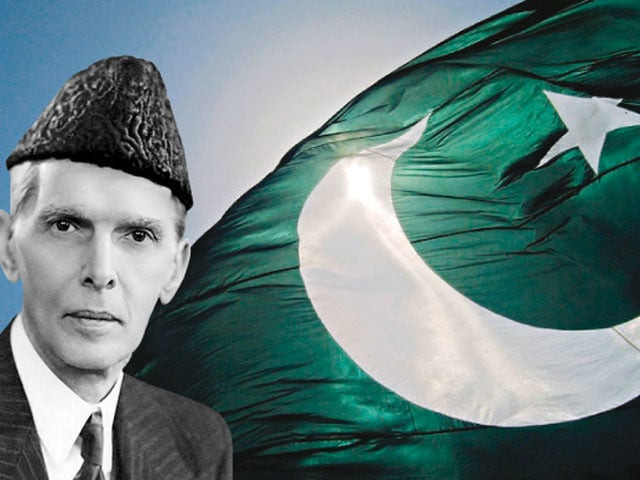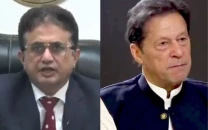Is there a leadership crisis?
Jinnah had no lieutenant who could take serious decisions or had the foresight to judge what was important.

During the discussions and deliberations for independence Jinnah suffered from a serious illness and his work took up most of his physical energy.
Unfortunately, he had no lieutenant who could be trusted to take serious decisions or had the foresight to judge what was important.
Divide (incorrectly) and rule
This was why nobody had any idea of Pakistan’s boundaries even four days after the country became a sovereign state. The fact that the Radcliffe Award report had to define our boundaries is a joke and I think it was the greatest blunder in our history.
The results of this mistake were not unexpected - the district of Gurdaspur which has a majority population of Muslims was given to India to provide a land route to Kashmir. We continue to suffer because of this. The two countries have fought three major wars but neither side has been able to take Kashmir by force.
Lack of vision in post-independence leadership
There was no team to manage governance except two junior joint secretaries: Ghulam Muhammad and Chaudhry Muhammad Ali.
Ali was the secretary general who headed a committee of secretaries to make strategic decisions which were sent to the cabinet. This was largely a formality.
The problem was that not a single person in the entire cabinet had political foresight or economic vision. Apart from this, there was a crowd of hundreds of thousands of refugees coming to Pakistan and it was a miracle how they were accommodated. Particularly after India refused to release any funds which were allocated to Pakistan as a consequence of the Partition.
Inspiration in adversity
So with this foundation, we started in a newly formed country. There was no accommodation or furniture for the staff of secretariat. In a hurry some barracks had been built for the Central Secretariat offices but there was no place to sit and the poor clerks worked while standing on the bare floors of those hutments. The clerks even had to buy the paper and pencils they used their own resources. They even had to attach papers to each other using thorns from wild bushes! In spite of all these problems, people's spirit, emotions and morale were high. Nobody was grumbling. Everyone felt that a dream had been fulfilled.
A country of dreams to disasters
Can somebody tell me where that spirit is now? From the very first day we were misled. We were led to believe that Pakistan is a ‘democracy’ rather an ‘Islamic democracy’. I have only one thing to say in response to this argument, that Islam has no concept of democracy. Democracy is a luxury for rich and educated nations which we are not. So, from the first day of Pakistan’s existence, we have been used by the civil bureaucracy. The main players were two joint secretaries and one deputy secretary who distributed the power as follows: Ghulam Muhammad ultimately became the governor general and Chaudhry Muhammad Ali the prime minister. To keep power in the family they had groomed Iskander Mirza who at the time of Partition was Deputy Commissioner of Peshawar when the post was equivalent to Deputy Secretary.
Actually, Iskander Mirza ‘belonged’ to the British Government. He had developed a new political service where personnel were taken from the army and also carried army ranks. So, Mirza held the rank of major and was transferred as Secretary for Defence. This was an honorary rank and was again bestowed to Colonel Iskander Mirza.
Post-colonial army bureaucracy
The first commander in chief was an Englishman by the name of Frank Messervy, his successor was to be General Iftikhar who unfortunately died in the Vehari air crash (with IG Police Sahabzada Aitzaz who was bringing the Liaquat Ali Khan murder file to Karachi).
This made Ayub Khan, only a Brigadier at the time, the senior most army official in the country. Meanwhile, the Kashmir conflict had developed. General Messervy refused to carry out Quaid-i-Azam’s orders and argued that British officers were on both sides. This is why Quaid-i-Azam changed Messervy and replaced him with another British General named Gracy. By now the intervention of United Nations had resulted in ceasefire in Kashmir.
In Pakistan, we had our own dramas, the government changed and a new Prime Minister would be appointed every six months or so. During this time, Ghulam Muhammad became extremely unpredictable and for two years Pakistan was governed by a President who some say was mentally unstable.
In the 1956 Constitution, Iskander Mirza was named President but in reality Deputy Secretary Iskander Mirza became the Governor General. Ayub was already the Commander and Chief as well as the Minister for Defence. With all this power at his disposal, he decided to take over the reins of the government and deposed Iskander Mirza. So there were eleven years of civil bureaucracy, in collusion with the police service.
The decades of dictatorship
The era of army rule started in 1958. There is no doubt that Ayub Khan’s government is considered to be a golden era of Pakistan. He had his qualities.
He was a great judge of human beings and had one of the finest cabinets, particularly the Finance Minister, Muhammad Shoaib, who was the father of industrialisation in 1965. There was a general during 1958 to 1965 which inspired envy across the border.
As is often the case in dictatorships, war turned out to be disastrous for Ayub Khan. We continue to suffer the consequences of the 1965 today. Ultimately, Ayub stepped down and handed power over to General Yahya Khan. Yahya basically was reputed to be a very good General but after taking on the role of head of state. Elections took place and broke the one unit even parity between East and West Pakistan.
Khan was supposed to hand over power after the elections but some power hungry politicians manipulated the situation and ultimately their ambitions were fulfilled. Pakistan was divided.
For a short period, army rule ended and Zulfikar Ali Bhutto, who had won by a majority only in West Pakistan, took over power. Technically, those elections were held in a different context and the Pakistan Peoples Party should have asked for another election, to lend their government credibility
But this was merely a civilian government. I hesitate to call it democratic.
The era of civilian dictatorship
Soon, jihadi organisations were present in the country and Islamisation was in full force. In addition to this, a violent ‘Kalashnikov culture’ developed. Today our country is a breeding ground for terrorism. The lucky or unlucky Ziaul Haq death occurred in an air crash but fortunately there was proper hierarchy in the country at the time.
After Chief of Army Staff General Mirza Aslam Baig decided not to take over, a power struggle began between Nawaz Sharif and Benazir Bhutto which ultimately resulted in another army takeover by General Pervez Musharraf who did a very good job from 2002 to October 1999. He was capable of taking the country to a positive place but his sudden decision to become the champion of democracy forced him to make a lot of compromises. All the dirt that is usually attributed to politics, blew around him.
Meanwhile, for reasons of his own, Musharraf wanted to remove the chief justice of the Supreme Court. However, the way he tried to do it was unethical. Chief Justice Iftikhar Muhammad Chaudhry also resisted all the pressure which was put on him to resign. With the help of colleagues and members of the legal fraternity a non-violent movement developed. Slowly and steadily, this movement started gaining strength when political parties lent their support to the first civil disobedience movement in the country. The president became unnerved.
Elections were held and against all his hopes, Musharraf’s supporting party PML-Q lost. The PPP emerged as a majority party. Though it did not have a simple majority but by forming a coalition with Muslim League (N), PPP formed a government and Asif Ali Zaradari was elected the President.
General Musharraf resigned and Prime Minister Yousaf Raza Gilani became head of the government.
The consequences of our actions
It is hardly amazing that a country with no foundation is shaking with these tremors of mismanagement. Here in our country, we are at war with fundamentalist as well as all sorts of calamities like floods, crime and earthquakes. But our media and leaders seem to be worried about everything except these issues. You can see your leaders worrying about the extension of our chief of army staff when he was given three years extension which is a normal administrative decision, 18th amendment and the reliability of the degrees of the members of the parliament. Having a fake degree is a criminal charge which should have been left to the law to take its own course. Now I am going to say something which may be shocking but I am only a student of history and historically whenever such things have prevailed in any country, democracy has never saved that country. It is only a strong and selfless person who is not fond of worldly riches who has brought back the country to its rightful place, in which I will give few examples. First of all in China, which was liberated after two years of our independence. It could not have been where it is now if there was no Mao Zedong. Next, Singapore, the country did not have any resources and actually Malaysia wanted to get rid of this useless piece of land. They had to buy even the water from Malaysia but today in the Far East, it is one of the powerful economies. It was done by a dictator Lee Kaun Yew. Thirdly, Malaysia, one of the most powerful economies was put on the raod to success by dictator Mahatir Muhammad.
So according to the above, our people have to decide what can save them. If they are happy with politicians who have been known to curse and scream and make accusations about each other and will keep on coming turn by turn and exploiting them, then that is a decision they must take.
Published in The Express Tribune, January 2nd, 2011.



















COMMENTS
Comments are moderated and generally will be posted if they are on-topic and not abusive.
For more information, please see our Comments FAQ